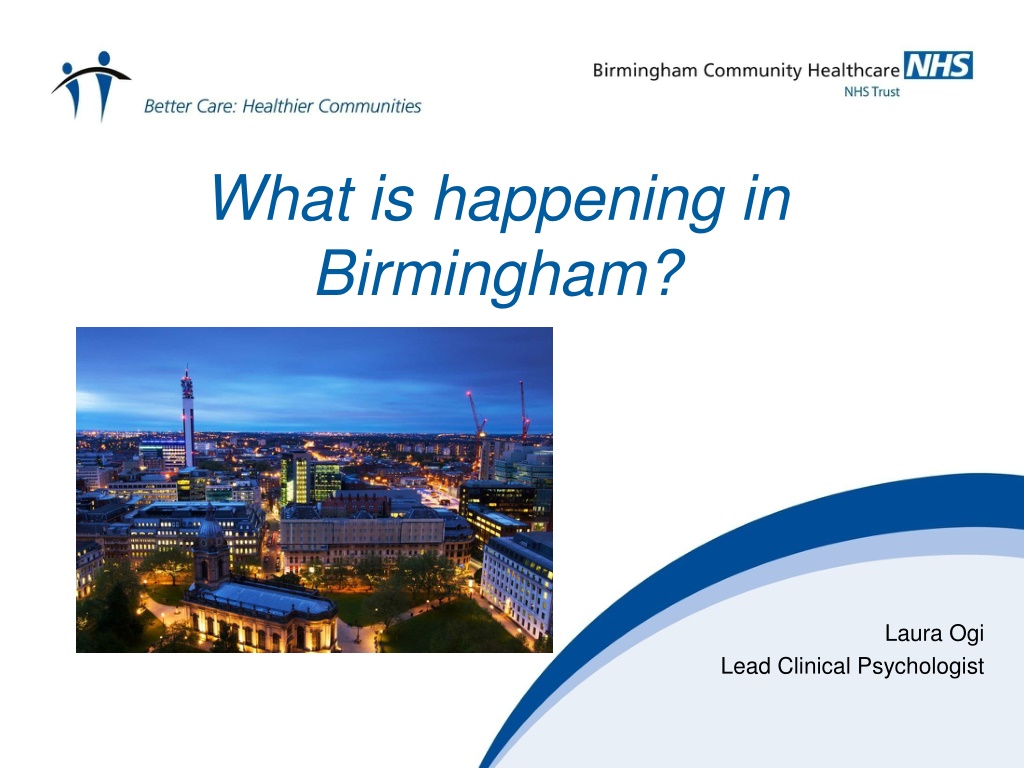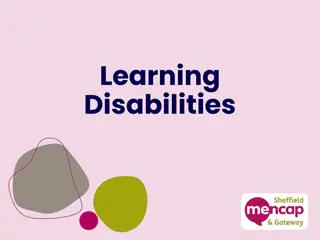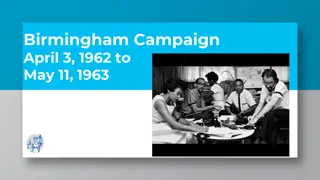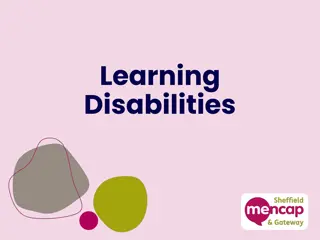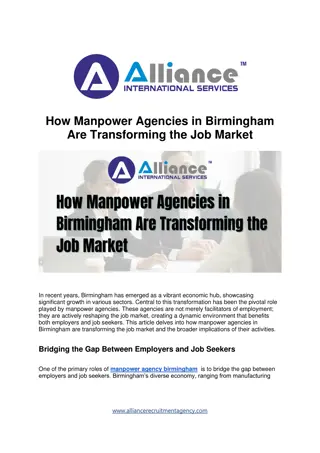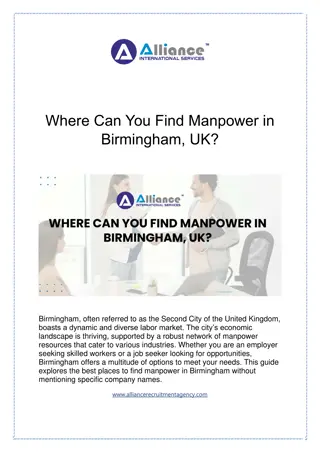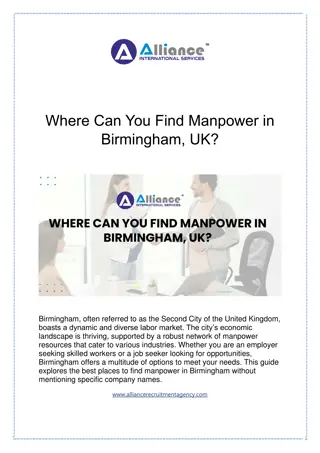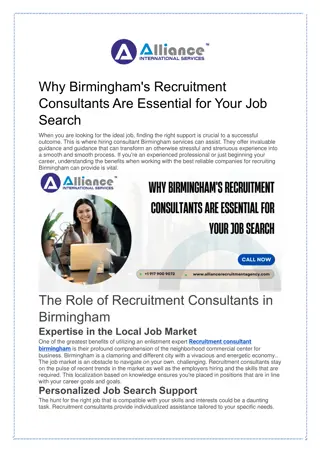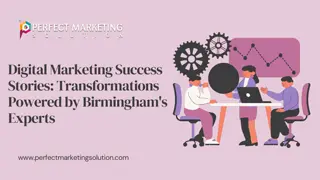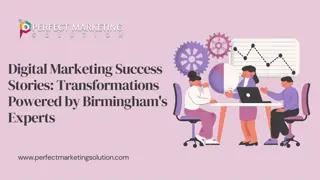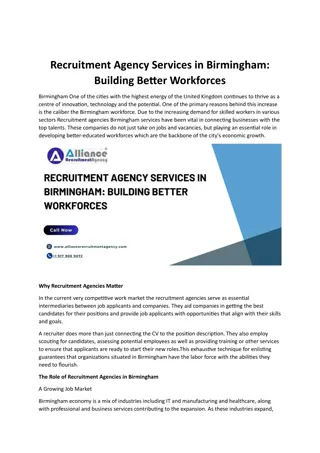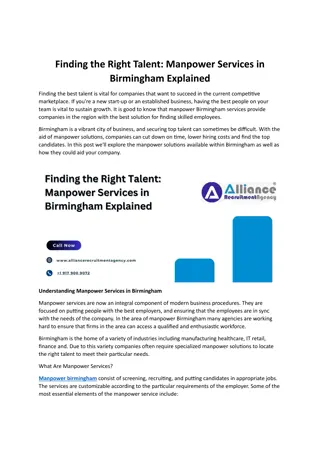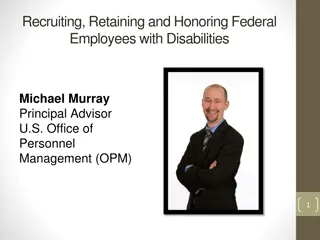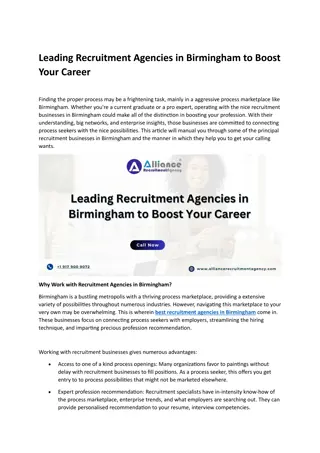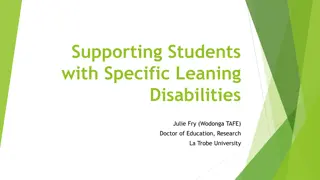Collaborative Efforts in Birmingham to Support Individuals with Learning Disabilities
Laura Ogi, Lead Clinical Psychologist, led a gathering in Birmingham involving various health professionals, representatives, and advocacy groups to discuss identifying and supporting individuals with learning disabilities. The group focused on building alliances, research participation, and developing a maternity pathway with specialized tools and collaborations. A checklist was provided to help workers identify people with learning disabilities easily.
Download Presentation

Please find below an Image/Link to download the presentation.
The content on the website is provided AS IS for your information and personal use only. It may not be sold, licensed, or shared on other websites without obtaining consent from the author. Download presentation by click this link. If you encounter any issues during the download, it is possible that the publisher has removed the file from their server.
E N D
Presentation Transcript
What is happening in Birmingham? Laura Ogi Lead Clinical Psychologist
Who did? LD Health professionals (speech and language therapists, psychologist, health facilitation team, community nurses) Healthwatch representative Advocacy groups Midwives Health visitors Safeguarding children s team and other safeguarding reps University researchers and anyone else who wanted to join in.
What did we do? Agreed to meet regularly Built rapport and attempted to understand each other s priority Identified areas to focus on
Areas of Focus 1. Facilitate identification 2. Maternity pathway 3. Continue to build the working alliance 4. On going research participation
1.Maternity Pathway Screening tool Easy read Maternity notes Easy read Post-natal notes Plan adaptation of the red book Family Nurse Partnership Program ( one LD participant identified in Birmingham) Research collaboration between services
IDENTIFYING PEOPLE WHO MAY HAVE A LEARNING DISABILITY PLEASE FOLLOW THE STEPS ON THIS TOOL This checklist aims to help voluntary and statutory workers (such as GP s, Health visitors, midwives, social workers and nurses) identify people with learning disabilities more easily. LEARNING DISABILITY STEP 1 1 Has an impact on most areasof a person s life Significantly reduced ability to understand new or complex information, to learn new skills (impaired intelligence) Reduced skills to cope independently with everyday life On E3 code or Learning Disability Register LEARNING DIFFICULTY Has an impact on a specific areaof a person s life (reading, writing, counting, coordination, speech) Specific difficulty in learning often given on an educational context: Dyslexia (difficulties with reading) Dyspraxia (difficulties with planning, executing and coordinating movement (person can be viewed as clumsy) Dyscalculia ( difficulties in learning and comprehending numbers) Other linguistic difficulties Please contact Main stream services or Mental health services These difficulties started in early childhood. Please continue with the form A person does not have a learning disability if he/she: Has gained GCSE, NVQ (above level 2), driving licence, has attended normal education without additional support, has completed complex purchases without help (Mortgage), has had normal development until head injury or accident when in adulthood (this is then classed as Head Injuries); has had normal development until Chronic Mental health develops (this is than classed as Mental Health). Impairment is a result of drug or alcohol abuse, or the disability is caused by hearing or sight impairment. ATTENTION There is a potential for certain life circumstances to alter the way in which an individual s ability is perceived. Recent trauma, mental ill health, English being a second language and use of certain medications may all have an impact on communication and understanding. It is important that these factors are checked before an assumption of learning disability is made. STEP 2 - HISTORY Please check if there is evidence to support the following: The person attended special school? They must have a Statement of Special Education highlighting that they have a Learning Disability. The person has had previous assessments by clinical psychologists, educational psychologists or psychiatrists indicating that the person has a Learning disability. You have checked with GP and the person is registered as someone with a learning disability (On E3 code or Learning Disability register) The person is receiving services from other Learning Disability professionals. 2 If you find evidence of the above, you DO NOT NEED to complete the remainder of the screening, as the person has already been identified as having learning disabilities. If not please continue to STEP 3
STEP 3 3 Please tick if there is evidence to support that the person: ATTENDING APPOINTMENTS Is often late for appointments, come on the wrong day, or gives odd excuses? Can t tell you how late they are? RECEIVING AND PROVIDING INFORMATION TRAVEL Finds it difficult to use public transport independently? Finds it difficult to travel to new/unfamiliar places independently? Is not able to manage own money or needs the help of someone else? Can t calculate change for a pound? Finds it difficult to estimate costs? BUDGETING AND MONEY MANAGEMENT Can t feedback to you what you have discussed on your meeting summarising or using own words? Finds it difficult to give clear information about themselves? Provides na ve or vague information about basic facts? Finds difficult remembering information previously given? LITERACY LEVEL OF SUPPORT Needs additional support to cope with daily living skills such as cooking, personal hygiene, own shopping? Is overwhelmed by routine demands? Can t read? Can t write? Can t understand a text you give them to read? If you ticked at least 3 boxes you need to consider making adjustments to the way your service is provided to this person. If you ticked at least 3 boxes please contact the Learning Disabilities Single Point of Access (SPA) If further support, advice or consultation is needed, please contact the Learning Disabilities Single Point of Access (SPA) Team Tel: 0121 4658797 Fax: 0121 465 8805 Post: LD Referrals, SPA The Greenfields E-mail: BCHNT.ldreferrals@nhs.net 30 Brookfield Rd, Kings Norton, Birmingham B30 3QY 30 Brookfield Rd, Kings Norton, Birmingham B30 3QY Tel: 0121 4663950 Fax: 0121 466 3921 Post: LD Referrals, SPA The Greenfields E-mail: BCHNT.ldreferrals@nhs.net For further information on this tool or to order more copies please contact: Laura.Ogi@bhamcommunity.nhs.uk
Purposes of screening tool Identification of people who could potentially benefit from specialist LD input Ruling out Time efficacy- Avoidance of inappropriate referrals/ speeding of appropriate referrals Highlights areas of deficiency in service provision (e.g. CQC and monitor) Reasonable adjustments Multiagency cooperation
Continue to build the working alliance Periodic teaching Hubs Beyond Prejudice - National Conference in Birmingham Participation on current research initiatives Professional training (e.g. health visitors, dentists, pediatricians, midwives, students).
The challenges Absence of a joint health/social pathway & care coordination Current pressures on services Parents with LD are no one s priority Continuous change of remits, people, phone numbers, and locations of services. Change in the health facilitation remit. Staff numbers
What have we learned so far? There are lots of challenges No one can do it all We can work together People want to join forces There are lots of wonderful people out there!
Laura Ogi Lead Clinical Psychologist BCHC Laura.Ogi@bhamcommunity.nhs.uk Tel. 0121- 4663440
